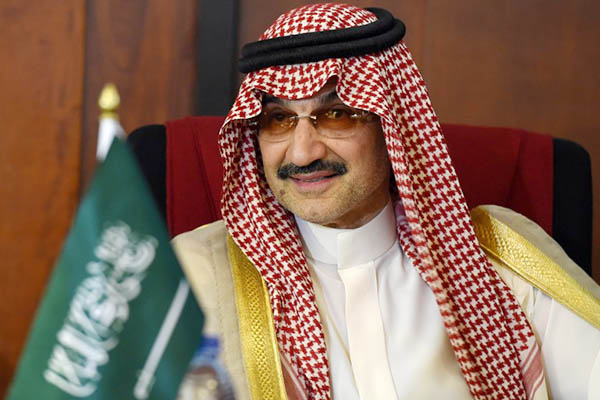
Ishara S. Kodikara—AFP
Prince remains head of his publicly listed company, according to government source
Saudi billionaire Prince Al-Waleed bin Talal was released on Saturday after nearly three months in detention following a “settlement” with authorities, as a sweeping anti-corruption campaign targeting the kingdom’s elite winds down.
Prince Al-Waleed, dubbed the Warren Buffett of Saudi Arabia, was the most high-profile detainee among 350 suspects rounded up since Nov. 4, including business tycoons and ministers, who were held in Riyadh’s luxury Ritz-Carlton hotel.
The prince was released following an undisclosed financial agreement with the government, similar to deals that authorities struck with most other detainees in exchange for their freedom. “The attorney general this morning approved the settlement with Prince Al-Waleed bin Talal,” paving the way for his release, a government source told AFP without disclosing figures.
When asked whether the prince was still the head of his publicly listed Kingdom Holding Company, the source who asserted he was guilty of corruption replied: “For sure.” A business associate also confirmed to AFP that the tycoon had been released.
Neither the prince nor the Saudi information ministry was available for comment.
The prolonged detention of Prince Al-Waleed, ranked among the richest men in the world, had sent shock waves across a host of companies that count him as a major investor.
Kingdom Holding—in which the prince has a 95 percent stake—owns The Savoy in London, the Fairmont Plaza and the famed George V hotel in Paris. The prince, who Forbes estimates is worth $18.7 billion, has also invested in Lyft and Twitter.
Prince Al-Waleed is the latest in a series of high-profile detainees to be freed from the hotel, as the campaign against elite corruption launched by Crown Prince Mohammed bin Salman draws to a close.
Authorities on Friday released media mogul Waleed al-Ibrahim, owner of influential Arab satellite network MBC. Ibrahim held a family gathering at his residence after his release, three MBC employees told AFP on condition of anonymity. The staff also received an official email congratulating them on his freedom.
The Financial Times reported earlier Friday that authorities had ordered Ibrahim to hand over his controlling stake in MBC to secure his release. Authorities have so far not commented on his case.
Another high-profile detainee, former National Guard chief Prince Miteb bin Abdullah, was released recently following his “settlement” with authorities which reportedly exceeded $1 billion. The government said most of those detained agreed monetary settlements in exchange for their freedom, which could earn state coffers about $100 billion.
Most detainees agreed on financial settlements in “cash, real estate and other assets,” Saudi-owned Al Arabiya television reported last week. The windfall will help the government finance a package announced by King Salman this month to help citizens cope with the rising cost of living, Finance Minister Mohammed al-Jadaan told Al Arabiya in Davos on Wednesday.
Crown Prince Mohammed, the 32-year-old son of the king, has spearheaded the unprecedented crackdown on corruption among members of the government and royal family, as he consolidates his grip on power.
Some critics have labeled the campaign a shakedown and a power grab, but authorities insist the purge targeted endemic corruption as the kingdom—in the midst of historic social and economic change—prepares for a post-oil era.
“Whether politically motivated or not, the Ritz Carlton arrests show a hopeful commitment to reducing top-level corruption,” said Mohammed Alyahya, a non-resident fellow at the Atlantic Council. “But the level of follow through will make or break Saudi Arabia’s transformation,” he wrote in a blog this week titled “After the Ritz-Carlton crackdown, what’s next?”
The Ritz-Carlton is set to reopen for business next month, sources at the hotel have said. Its website lists rooms as available from Feb. 14.
